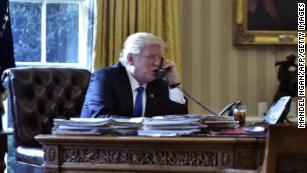In response, his briefers -- who must make difficult judgment calls every day on which intelligence to highlight to the President -- reduced the amount of Russian-related intelligence they included in his oral briefings, instead often placing it only in his written briefing book, a document that is provided daily and sometimes extended to several dozen pages containing the intelligence community's most important information .
But his briefers discovered over time that he often did not read the briefing book, leaving him unaware of crucial intelligence, including threats related to Russia and other parts of the world.
When asked about CNN's reporting that Trump is resistant to intelligence warnings about Russia, Director of National Intelligence John Ratcliffe told CNN, "this is totally false" in a statement Tuesday. Ratcliffe took the job in May.
National security adviser Robert O'Brien said Wednesday that the President was not briefed on the Russia bounty intelligence because it had not been corroborated.
"The President was not briefed because at the time of these allegations they were uncorroborated," O'Brien said. "The President's career CIA briefer decided not to brief him because it was unverified intelligence ... and knowing all the facts I know, I certainly support her decision."
He called it "ridiculous" that any information would be held back from the President over fears it would upset him. "We brief him on everything he needs to know to keep the country safe. So any thought that we wouldn't brief him on something because it would anger him, I don't even know how to respond to that question."
The White House had not responded to a request for comment on this story as of Wednesday afternoon.
Judging how to use the limited time of their oral briefings with the President was a difficult decision for senior US intelligence officials. One former senior intelligence official who served in the Trump administration explained that the agencies' job is to present the President with the broadest view of all the threats facing the United States. If the President was obsessed with just one threat, this official continued, he wouldn't listen to intelligence on other threats, in which case a key line of communication between the intelligence agencies and the commander in chief would be damaged or lost.
They calculated it was best to reserve their limited chances to include such intelligence to the times when the threats were most severe.
"Never casually go in on Russia, decide when it's differential," this former senior intelligence official said describing the intelligence community's approach to his oral briefings, "Save it for when it matters."
The end result was the President now heard less, not more, about the threat posed by one of the nation's most dangerous adversaries. Among his national security staff, this approach led to fears that the President was becoming less and less aware of the threat from Russia, even as the intelligence confirming the country's misbehavior mounted.
"It creates a self-fulfilling prophecy where he hears less and less of what he doesn't want to hear and therefore starts to believe more and more that the Russians aren't doing anything bad," the former senior NSC official said, explaining that when Trump later claimed in public that he hadn't seen evidence of Russian aggression, he was sometimes telling the truth -- but the reason he hadn't seen it was that they hadn't shown it to him fearing it would provoke a negative reaction.






















No comments:
Post a Comment